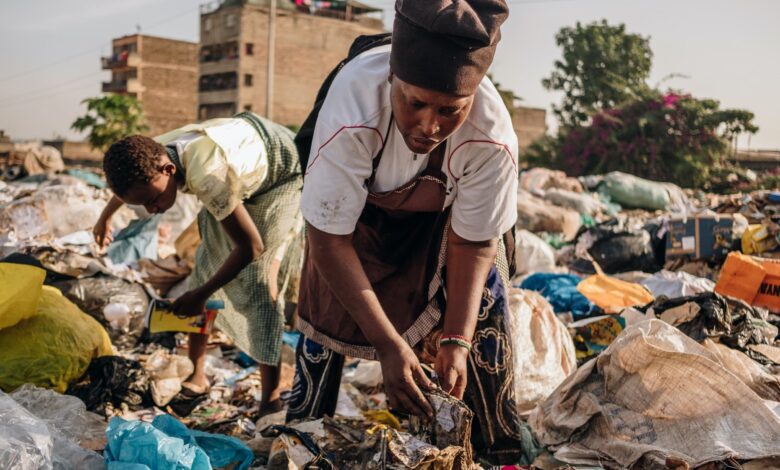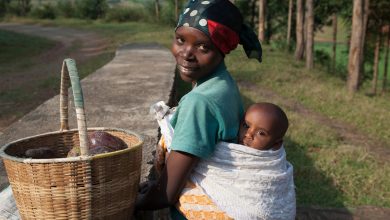Namibia women make living by turning plastic waste into crafts
According to Shifeta, the country faces waste management concerns such as a lack of waste collection services in many areas, widespread littering, and inappropriate management practices at waste disposal sites.

As Namibia struggles with waste management, single mothers from Namibia’s capital Windhoek are being trained by the non-profit-making organization, Mammadu Trust, to upscale plastic bags and crochet accessories.
The women who are from poor backgrounds are using plastic bags or plastic yarn, made from strips of plastic bags that are looped together to form a continuous strand, which they crochet into a variety of products which include fruit baskets, handbags, table mats as well as rugs.
This craft has lifted 47-year-old Belinda Kaaronda out of poverty, exposing her to a different lifestyle where she is now able to fend for herself and her six children from the income she makes when the bags are sold to tourists and abroad.
“Plastic bag weaving has saved my life. It has been a lifeline at a point when I had lost all hope. Before I started doing this, my life was very hard. I am now finally earning an income and able to take care of my family. I am grateful for the training I have received,” a hopeful Kaaronda said through a translator.
When Kaaronda first joined the group of women being trained at Mammadu Trust In 2017, she had no idea how this would change her life, not only financially but also by igniting a dream she has had since she was a child.
“Growing up I had dreams of becoming a fashion designer. I trained as a tailor but my dream did not go far. Through crocheting accessories, I get to tap into my design side and come up with some unique one of kind items. Whether it is the structure, colours, or patterns, each item is always unique,” she said.
The mother of six is still keeping her dream alive and hopes to expand and venture into dressmaking.
“I want to have the capacity to produce more and one day be able to see my products in local stores. I have big dreams,” she said laughing.
Admittedly, the process and the amount of work it takes from looking for plastic bags to finishing a product is a lot but Kaaronda said she would not trade it for anything.
In the past five years, Kaaronda has turned plastic bags into more accessories than she can count with hopes of making even more in the future.
According to Domenica Deiure, Manager at Mammadu Trust, the project started in 2015 as an initiative to generate income for mothers and other women from the neighbourhood. Since 2015 helps more than 50 women out of poverty.
“There is usually no cost for the material as it is all recycled material so there is a 100 percent profit for the woman who produces the object. This not only helps her financially but it also gives the women a sense of empowerment and self-esteem,” she said.
Mammadu not only trains the women but also helps with marketing and sales where most of the items are sold internationally.
Silpha Pujatura is also one of the women who has benefited from the training offered by Mammadu Trust and is doing very well compared to when she had no income.
“My life was very poor before I started doing this but my life has changed drastically. I even moved from a corrugated iron shack where I lived to a nice house,” she said.
Pujatura was one of the first women to receive training in 2015 and is now training other women in her community while she has also expanded her craft and is using old clothes to make pot plants.
“I am venturing into other crafts to reach a bigger market. I want to grow my business,” a passionate Pujatura said.
Women are playing a small but substantial role in helping the country manage waste which is a problem for Namibia which grapples with illegal dumping in many areas.
In 2019, the country launched a revised solid waste management strategy containing guidelines for waste disposal sites on how to dispose of waste to ensure the environmentally sound management of waste
In a previous interview, Minister of Environment, Forestry, and Tourism Pohamba Shifeta said waste management had become a pressing national issue posing a significant threat to human and environmental health.
According to Shifeta, the country faces waste management concerns such as a lack of waste collection services in many areas, widespread littering, and inappropriate management practices at waste disposal sites.
As the women continue to turn trash into treasure, they hope to train more unemployed women to take up the craft and make a living from it just like they are.






